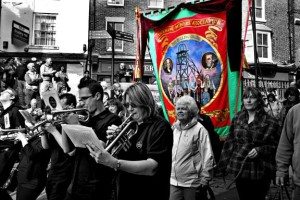Ken Loach: The Spirit of ’45 and Q&A at Warwick Arts Centre
A screening of The Spirit of ’45 by director Ken Loach at the Warwick Arts Centre, 6th November, was followed by a Q&A with the director.
Ken Loach is one of those engaged directors, alongside the Dardenne brothers from Belgium and Abdellatif Kechiche from France, whose films often deal with specific social issues, weather it is homelessness in Cathy Come Home or the exploitation of illegal immigrants labour in It’s a Free World, whose films struck by their grit and realism. His recent film The Spirit of ‘45 (2013) is a documentary recounting the creation of the British welfare state, which started at this pivotal year, a time where Britain had won the toughest of wars, but had an even tougher endeavour to undertake, to reconstruct a new unified society after the material and social damages it incurred as a result. The documentary shines a light on the success of the welfare state, nationalisation, the National Health Service, council housing, all associated with the Labour government. Loach here intertwines colourful archives and footage and interviews shot in black and white, rendering the cinematic experience very vivid and evocative, conveying the nostalgia of past labour and socialists aspirations. Notable for casting unprofessional actors, Loach believes their personal experiences can help them embrace their roles. He gives voice to people who witnessed that change in Britain, notably a nurse, a miner, a doctor.
The documentary generated an emotional atmosphere and a real political discussion. As with people in the documentary, people did not hesitate to share their own views and personal experience
People who share their often painful emotional accounts about the hardships of growing up in poor pre-war Britain are linked to the initial success of the welfare state. These new radical changes, including the first free medical appointment, of having a new home with a back garden, the creation of labour rights are all linked with the development of a more caring society based of solidarity and unity. That is, until its dismantlement, linked with the arrival of Thatcher, whose appearance on the screen caused a strong reaction in the room. Thus, the documentary feels very much like a drama as well. Loach doesn’t skimp on emotion for the viewer, where the film shined a light on Attlee government’s success, it also portrays the slow decay of its welfare state in its last act. It is fair to say the documentary carries a left wing political agenda. The film embraces socialism, notions of public goods and ownership mirroring the idealism that infused post war Britain. Loach has never hidden his political orientation, and moreover his support for the fights and struggle of Britain’s working class. Where Britain’s working class often serve as the narrative of his feature films, here it is ever more striking.
The screening was followed by a live Q and A with Ken Loach himself. For a renowned director, one of Britain’s most respected and praised, Ken Loach strikes through his simplicity. The documentary generated an emotional atmosphere and a real political discussion. As with people in the documentary, people did not hesitate to share their own views and personal experiences, this lead to touching contribution by a nurse from Liverpool lamenting on the on going privatisation of the NHS as well as 19 year old student reflecting on the aftermath of Thatcherism in his northern city. Loach is someone who is keen on answering questions, developing them, he even addressed the Palestine topic, and gave advice regarding the “industry”, while also listening to the public.
At a time where the remaining institutions of welfare state are threatened and where society is ruled by personal gain, the will to capture the spirit of ‘45, this unique momentum prone to change and solidarity seems urgent. Urgency is also what would characterised the atmosphere in the room, the pressing need to come together, to change the direction where the United Kingdom, where the world even, is heading now. Ken Loach proves that once more, films can have a real political scope.


Comments